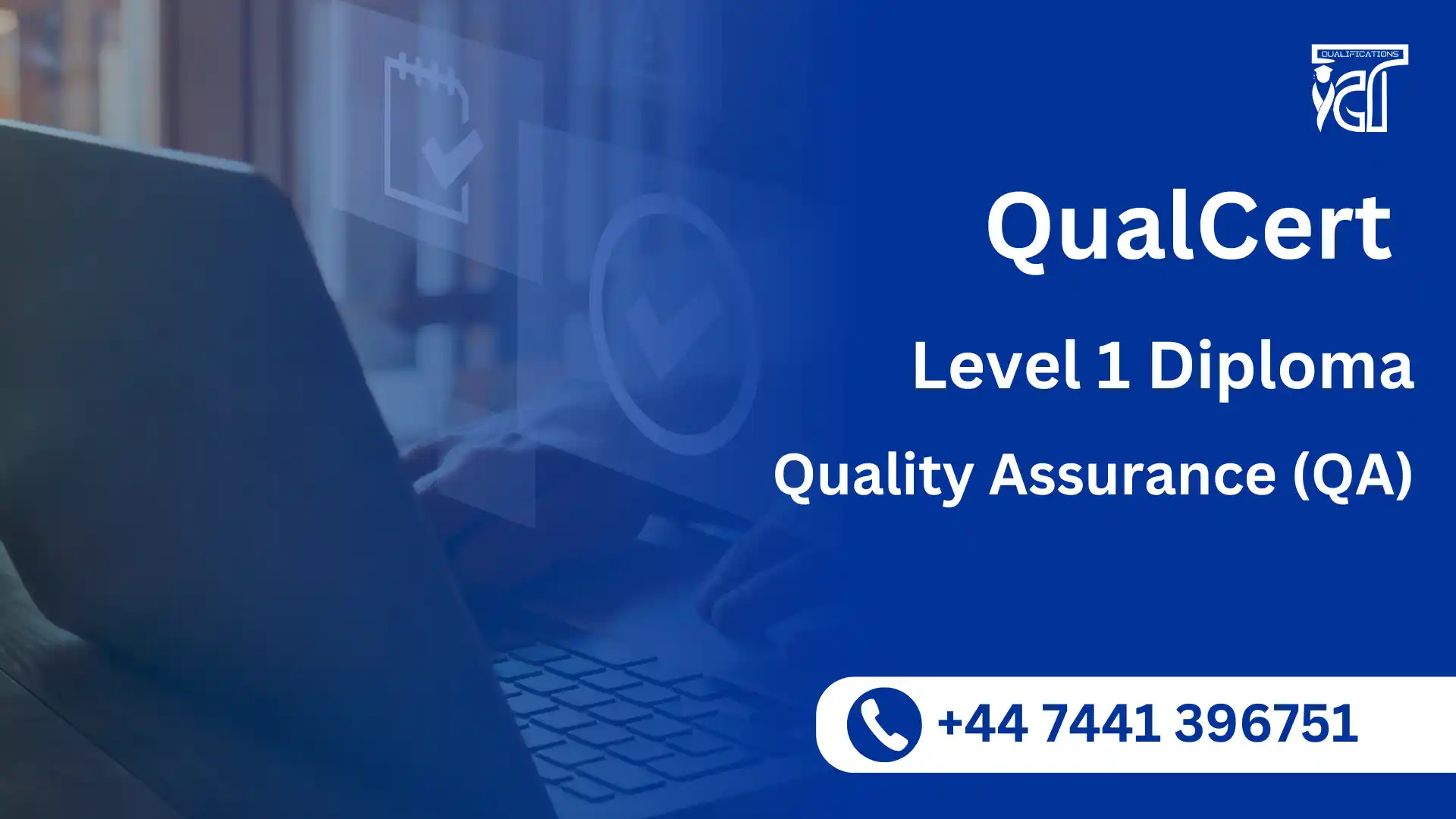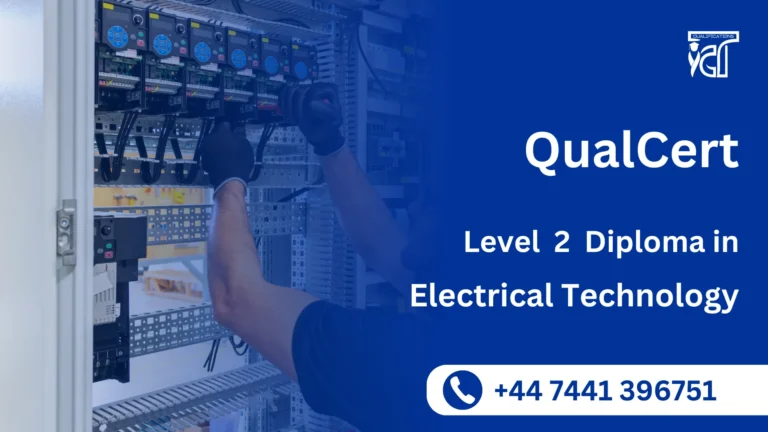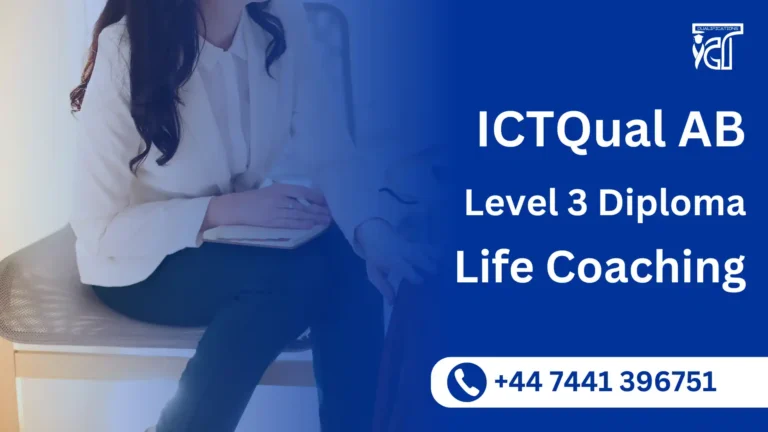The QualCert Level 1 Diploma in Quality Assurance (QA) is an introductory qualification designed for individuals who are completely new to the field of quality. This course provides a clear, accessible starting point for learners to develop a basic understanding of quality principles, processes, and workplace responsibilities related to maintaining product and service standards.
Ideal for school leavers, entry-level job seekers, or individuals working in supportive roles, this qualification introduces essential concepts such as the importance of quality, basic inspection techniques, record-keeping, and compliance with simple quality procedures. It also helps learners build confidence in following instructions, understanding workplace expectations, and contributing to a quality-conscious environment.
The program emphasizes practical awareness and foundational knowledge that can be applied across industries such as manufacturing, logistics, packaging, food production, and more. No prior experience or technical background is required, making this diploma suitable for anyone looking to begin their journey in the quality sector.
By completing the QualCert Level 1 Diploma in Quality Assurance, learners gain the skills and confidence to take on entry-level quality-related responsibilities and prepare for further progression in the quality assurance career pathway.
QualCert Level 1 Diploma in Quality Assurance (QA)
The QualCert Level 1 Diploma in Quality Assurance (QA) certification is designed to provide a structured and comprehensive framework for developing expertise in quality assurance. Below is the qualification structure, including the Total Qualification Time (TQT) 180, Guided Learning Hours (GLH) 120, and 30 Credits associated with the program.
| Unit Ref# | Unit Title | Credit | GLH | TQT |
| QC07008 – 1 | Quality Assurance Fundamentals | 5 | 20 | 30 |
| QC07008 – 2 | Basic Auditing in QA | 5 | 20 | 30 |
| QC07008 – 3 | Introduction to Quality Control | 5 | 20 | 30 |
| QC07008 – 4 | QA Documentation Basics | 5 | 20 | 30 |
| QC07008 – 5 | Reporting and Feedback in QA | 5 | 20 | 30 |
| QC07008 – 6 | Communication Skills in QA | 5 | 20 | 30 |
GLH (Guided Learning Hours) and TQT (Total Qualification Time) are terms commonly used in vocational qualifications to help define the amount of time a learner is expected to spend on their studies.
1. GLH (Guided Learning Hours)
GLH refers to the number of hours a learner spends being directly taught, supervised, or supported during their course. This includes the time spent in activities such as:
- Classroom instruction
- Practical workshops
- One-on-one tutoring or mentoring sessions
- Online learning sessions with tutor support
In other words, GLH represents the time that learners are actively engaged with their instructors or learning activities.
2. TQT (Total Qualification Time)
TQT represents the total amount of time a learner is expected to invest in completing a qualification, including:
- GLH (Guided Learning Hours): Time spent on direct learning, as explained above.
- Self-Directed Learning: This includes time spent on independent study, research, assignment completion, preparation for exams, and any other work the learner does outside of direct teaching hours.
TQT is a broader measure that includes all the time required to achieve the qualification. It helps learners and employers understand the overall commitment required for the qualification.
Key Differences Between GLH and TQT:
- GLH focuses on direct learning with guidance or supervision.
- TQT includes GLH as well as independent study time and other learning-related activities.
Example:
If a qualification has a TQT of 600 hours and a GLH of 250 hours, it means the learner should spend 250 hours in direct learning (classroom, online, or tutor-led sessions) and 350 hours on independent study or research.
Quality Assurance Fundamentals
- Understand the key principles and concepts of quality assurance.
- Recognize the importance of quality standards and compliance in various industries.
- Identify the role of QA in maintaining product and service quality.
- Differentiate between quality assurance and quality control.
Basic Auditing in QA
- Understand the fundamentals of quality audits and their significance.
- Learn how to conduct basic internal audits within a QA framework.
- Identify non-conformities and recommend corrective actions.
- Interpret audit findings and contribute to continuous improvement.
Introduction to Quality Control
- Explain the role of quality control in the manufacturing and service sectors.
- Understand common quality control techniques and tools.
- Identify defects and implement corrective and preventive actions.
- Analyze quality data to support decision-making processes.
QA Documentation Basics
- Learn the importance of proper documentation in quality assurance.
- Understand different types of QA documents, including SOPs, checklists, and reports.
- Develop skills to create, manage, and maintain quality records.
- Ensure compliance with documentation standards and best practices.
Reporting and Feedback in QA
- Understand the significance of accurate reporting in quality assurance.
- Learn how to compile and present QA reports effectively.
- Develop skills in providing constructive feedback for process improvement.
- Utilize reporting tools and methods to track and analyze quality trends.
Communication Skills in QA
- Develop effective communication techniques for QA professionals.
- Learn how to collaborate with teams to maintain quality standards.
- Understand the role of communication in problem-solving and conflict resolution.
- Enhance skills in presenting QA findings and recommendations clearly.
Foundation in QA Principles
Gain a solid introduction to the core concepts and methodologies of quality assurance, preparing you for more advanced qualifications in QA and related fields.
Career Entry into QA Roles
This diploma opens doors to entry-level roles such as Quality Assistant, Inspection Clerk, or Junior QA Officer in manufacturing, logistics, healthcare, and service industries.
Industry-Relevant Knowledge
Learn about key QA practices, documentation control, basic auditing processes, and quality standards that are applicable across various industries worldwide.
Improved Workplace Competency
Enhance your understanding of workplace procedures, compliance, and quality control techniques, making you a more effective and efficient employee.
Personal Development
Strengthen soft skills like attention to detail, analytical thinking, documentation accuracy, and basic problem-solving abilities.
Progression Opportunities
Acts as a stepping stone to higher-level QA qualifications, including Level 2 or Level 3 diplomas in Quality Assurance or Total Quality Management.
Globally Recognized Certification
A QualCert diploma adds credibility to your resume and provides recognition that meets international vocational standards.
Flexible Learning Format
Many training providers offer the course in flexible learning modes—online, blended, or part-time—making it accessible for working professionals and students.
Supports Regulatory Compliance
Helps learners understand basic regulatory and compliance principles relevant to ISO standards and other quality frameworks.
Affordable and Accessible
Designed as an introductory course, it is budget-friendly and accessible for individuals with no prior QA experience or technical background.
The ideal candidate for this qualification is someone who:
- Is New to Quality Assurance
Individuals who are beginning their journey in quality management or seeking to understand basic QA concepts for the first time. - Holds No or Minimal Formal Experience in QA
Those with little to no background in quality control or assurance but have an interest in entering the field. - Has a Basic Educational Background
Learners who have completed secondary school (or equivalent) and are looking for vocational training to enhance their career prospects. - Aspires to Work in Technical or Administrative Roles
People aiming for roles such as Quality Assistant, Documentation Clerk, Production Line Inspector, or Junior Compliance Support. - Seeks Career Entry or Transition
Job seekers or career changers interested in entering quality-related roles in sectors like manufacturing, healthcare, education, or logistics. - Wants to Build a Foundation for Further Study
Learners planning to progress to more advanced certifications (e.g., Level 2 or Level 3 in QA, ISO auditing, or Total Quality Management). - Prefers Practical, Job-Ready Skills
Individuals looking for hands-on, applicable skills that can be used immediately in the workplace. - Is Detail-Oriented and Process-Focused
Those who are naturally attentive to detail, process compliance, and documentation accuracy. - Values Flexibility in Learning
Ideal for individuals who need flexible study options, such as part-time or online learning, due to work or personal commitments. - May Come from Diverse Sectors
Suitable for professionals from varied industries (e.g., manufacturing, customer service, healthcare) who want to integrate QA practices into their roles.
Entry Requirements
Register Now
Qualification Process
Qualification Process for the QualCert Level 1 Diploma in Quality Assurance (QA)
- Self-Assessment:
Begin by evaluating your eligibility to ensure you meet the qualification requirements, including work experience, knowledge, and language proficiency. - Registration:
Complete your registration by submitting the required documents, including a scanned copy of a valid ID, and paying the registration fee. - Induction:
An assessor will conduct an induction to confirm your eligibility for the course and explain the evidence requirements. If you do not meet the criteria, your registration will be canceled, and the fee will be refunded. - Assignmnets & Evidence Submission:
Provide all assignmnets and the necessary evidence based on the assessment criteria outlined in the course. If you are unsure of the required evidence, consult with the assessor for guidance on the type and nature of evidence needed. - Feedback and Revision:
The assessor will review your submitted evidence and provide feedback. Evidence that meets the criteria will be marked as “Criteria Met,” while any gaps will be identified. You will be asked to revise and resubmit if needed. - Competence Evidence:
Submit final evidence demonstrating that all learning outcomes have been met. This evidence will be marked as “Criteria Met” by the assessor once it is satisfactory. - Internal Quality Assurance (IQA):
The Internal Quality Assurance Verifier (IQA) will review your evidence to ensure consistency, quality, and compliance with standards. - External Verification:
The IQA will submit your portfolio to QualCert External Quality Assurance Verifiers (EQA) for final confirmation. The EQA may contact you directly to verify the authenticity of your evidence. - Certification:
Upon successful completion of all checks, QualCert will issue your official certificate, confirming that you have attained the QualCert Level 1 Diploma in Quality Assurance (QA).







